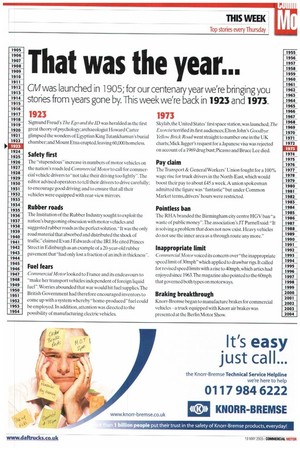That was the year...
Page 13

If you've noticed an error in this article please click here to report it so we can fix it.
CM was launched in 1905; for our centenary year we're bringing you stories from years gone by. This week we're back in 1923 and 1973.
1923
Sigmund Freud's The Ego and the ID was heralded as the first great theory of psychology; archaeologist Howard Carter glimpsed the wonders of Egyptian ICingTutankhamun's burial chamber: and Mount Etna erupted. leaving 60,000 homeless.
Safety first
The "stupendous" increase in numbers of motor vehicles on the nation's roads led Commercial Motor to call for commercial vehicle drivers to "not take their driving too lightly".The editor advised operators to tell their drivers to drive carefully; to encourage good driving; and to ensure that all their vehicles were equipped with rear-view mirrors.
Rubber roads
The Institution of the Rubber industry sought to exploit the nation's burgeoning obsession with motor vehicles and suggested rubber roads as the perfect solution."It was the only road material that absorbed and distributed the shock of traffic," claimed Evan J Edwards of the IRI. He cited Princes Street in Edinburgh as an example of a 20-year-old rubber pavement that -had only lost a fraction of an inch in thickness".
Fuel fears
Commercial Motor looked to France and its endeavours to "make her transport vehicles independent of foreign liquid fuel". Worries abounded that war would hit fuel supplies.The British Government had therefore encouraged inventors to come up with a system whereby "home-produced" fuel could be employed. In addition, attention was directed to the possibility of manufacturing electric vehicles.
1973
Skylab, the United States' first space station,was launched; The Exorcist terrified its first audiences;Elton John's Goodbye Yellow Brick Road went straight to number one in the UK charts;Mick Jagger's request for a Japanese visa was rejected on account of a 1969 drug bust; Picasso and Bruce Lee died.
Pay claim
The Transport & General Workers' Union fought for a 100% wage rise for truck drivers in the North-East, which would boost their pay to about £45 a week.A union spokesman admitted the figure was "fantastic" but under Common Market terms, drivers' hours were restricted.
Pointless ban
The RHA branded the Birmingham city centre HGV ban"a waste of public money".The association's JT Pamell said: "It is solving a problem that does not now exist. Heavy vehicles do not use the inner area as a through route any more."
Inappropriate limit
Commercial Motor voiced its concern over "the inappropriate speed limit of 30mph" which applied to drawbar rigs. It called for revised speed limits with a rise to 40mph, which artics had enjoyed since 1963.The magazine also pointed to the 60mph that governed both types on motorways.
Braking breakthrough
Knorr-Bremse began to manufacture brakes for commercial vehicles a truck equipped with Knorr air brakes was presented at the Berlin Motor Show.














































































































































































































